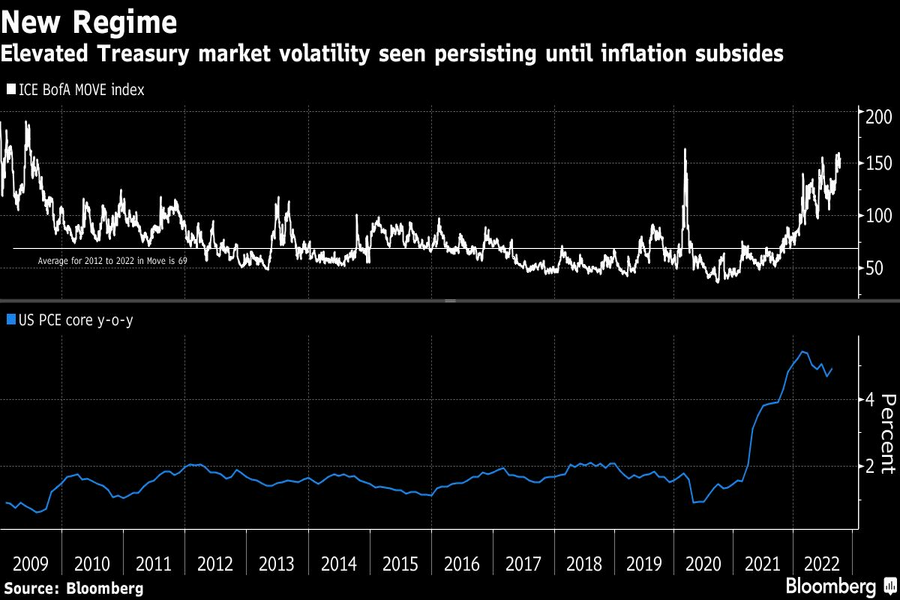

For bond traders, the upward drift of Treasury yields hasn’t been that hard to predict. It’s the short-term swings that are vexing.
The world’s largest bond market is being whipsawed by its longest stretch of sustained volatility since the onset of the financial crisis in 2007, marking a stark break with the stability seen during the long era of historically low interest rates. And the uncertainty that’s driving it doesn’t appear set to fade anytime soon: inflation is still running at a four-decade high, the Federal Reserve is raising interest rates aggressively, and Wall Street is struggling to gauge how well a still-resilient economy will hold up.
The upshot is that money managers see no respite from the turbulence.
“Bond market volatility will stay elevated for the next six to 12 months,” said Anwiti Bahuguna, portfolio manager and head of multi-asset strategy at Columbia Threadneedle. She said the Fed could pause its rate hikes next year only to resume if the economy is stronger than expected.

The sustained volatility has driven some major buyers to the sidelines, draining cash from a market contending with the worst annual loss since at least the early 1970s. On Thursday, Bank of America Corp. analysts warned that Treasury-market liquidity — or the ease with which bonds are traded — has deteriorated to the worst since the Covid crash of March 2020, leaving it “fragile & vulnerable to shock.”
After retreating from June through early August, Treasury yields have surged back as a key measure of inflation jumped in September to the highest since 1982 and employment has remained strong. Those figures and comments from Fed officials have led the market to expect that the Fed will push its rate to a peak near 5% early next year, up from a range of 3% to 3.25% now.
The coming week’s main data releases are not expected to shift that outlook. The Commerce Department is expected to report that an inflation gauge, the personal consumption expenditure index, accelerated to an annual pace of 6.3% in September while the economy expanded by 2.1% during the third quarter, rebounding from the drop in the previous three months. Meanwhile, central bank officials will be in their self-imposed quiet period ahead of their November meeting.
The widespread expectation that the Fed will enact its fourth straight 0.75 percentage point on Nov. 2 has effectively pushed questions about where monetary policy is headed into next year. There’s still considerable debate about how high the Fed’s key rate will ultimately go and whether it will drive the economy into a recession, especially given the mounting risks of a global slowdown as central banks worldwide tighten in concert.
The uncertainty was underscored Friday, when two-year Treasury yields rose, only to tumble as much as 16 basis points after the Wall Street Journal reported that the Fed is likely to discuss plans to potentially slow the pace of its rate hikes after next month.
“If they pause after inflation is falling and the economy is slowing then market volatility will decline,” said Steve Bartolini, portfolio manager of fixed income at T. Rowe Price. “The day the Fed pauses should see volatility decline, but we are unlikely to go back to the low vol regime of the 2010s.”
While the high volatility can provide buying opportunities, any effort to call a bottom has been thwarted as yields drifted higher. Moreover, investors are also mindful that recessions and financial crises that have followed excessive monetary tightening in the past were associated with notable spikes in volatility.
That potentially spells more pain for leveraged financial investments that took off in a world of low inflation, rates and volatility, said BlackRock Inc.’s Bob Miller, head of Americas fundamental fixed income. But for other investors “there will be opportunities to take advantage of dislocations in markets and build fixed-income portfolios with attractive yields above 5%.”
Still, he expects the market to continue to be buffeted by price swings. “Implied volatility is clearly the most elevated since 1987 outside of the global financial crisis,” Miller said. “We are not going back to the prior decade experience,” he said, “any time soon.”

Since Vis Raghavan took over the reins last year, several have jumped ship.

Chasing productivity is one thing, but when you're cutting corners, missing details, and making mistakes, it's time to take a step back.

It is not clear how many employees will be affected, but none of the private partnership's 20,000 financial advisors will see their jobs at risk.

The historic summer sitting saw a roughly two-thirds pass rate, with most CFP hopefuls falling in the under-40 age group.

"The greed and deception of this Ponzi scheme has resulted in the same way they have throughout history," said Daniel Brubaker, U.S. Postal Inspection Service inspector in charge.
Stan Gregor, Chairman & CEO of Summit Financial Holdings, explores how RIAs can meet growing demand for family office-style services among mass affluent clients through tax-first planning, technology, and collaboration—positioning firms for long-term success
Chris Vizzi, Co-Founder & Partner of South Coast Investment Advisors, LLC, shares how 2025 estate tax changes—$13.99M per person—offer more than tax savings. Learn how to pass on purpose, values, and vision to unite generations and give wealth lasting meaning
